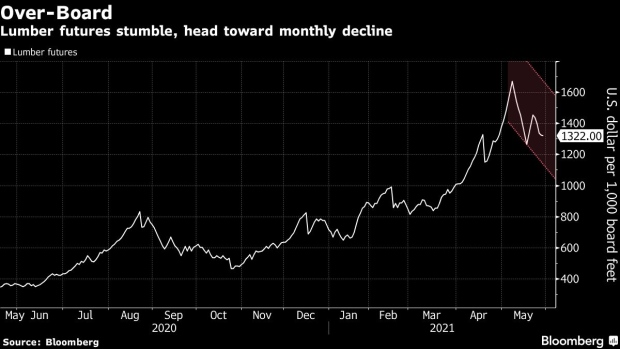May 28, 2021
Lumber gauge finally slips in further sign boom may be easing
, Bloomberg News
North America's debt burden will overwhelm the commodity boom: David Rosenberg
A gauge of lumber prices has dropped from records for the first time in months, adding to signs that a historic rally may be ebbing.
A benchmark of Western spruce, pine and fir lumber prices declined for the first time in 18 weeks, CIBC analyst Hamir Patel said Friday in a note titled “Lumber Pricing Decline Now Clearly Underway,” citing data from trade publication Random Lengths.
The drop comes on top of a tumble in lumber futures, which have fallen as much as 30 per cent from an all-time high reached earlier this month. Sawmills appear to be catching up with the voracious home building demand in North America that fueled a months-long rally, with vaccinated Americans starting to take vacations again rather than spending on renovations and building projects shelved due to high prices and material shortages.
“We’re seeing demand slow down and more supply coming to the marketplace,” said Josh Goodman, vice president of purchasing for Sherwood Lumber Co. in New York. “We’re definitely buying less.”

The lumber wholesaler typically holds 45 to 60 days worth of inventory, but now that market dynamics appear to be easing and prices are expected to fall lower, the company is keeping just 30 to 35 days worth on hand.
Random Lengths reported that the price of Western spruce-pine-fir dropped 1.8 per cent to US$1,600 per 1,000 board feet this week, according to CIBC. Southern yellow pine two-by-fours slumped 5.8 per cent, while the Random Lengths Composite dropped 1 per cent below a record high, Patel said.
Lumber futures on Chicago Mercantile Exchange are on course for a monthly decline after touching a record high earlier in May.
AThough there are signs that home renovations are easing and U.S. lumber supplies are rising, demand is still strong and buyers will have to return to the market relatively soon, according to Patel. This could keep prices above US$1,000 per 1,000 board feet throughout 2021, he said.
For now, wholesalers who supply lumber yards have reduced the amount they’re buying at high prices in hopes that the decline will continue.
“There’s no more crazy panic in the streets,” Goodman said. “But things can change very quickly.”





